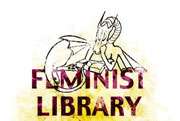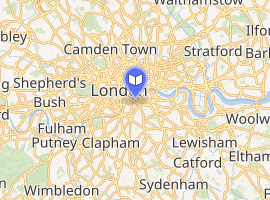Feminist Library
The Feminist Library was founded as the Women's Research and Resources Centre in 1975 by a group of women concerned about the future of the Fawcett Library to ensure that the history of the women's liberation movement survived. The founders included feminist academics like Diana Leonard and Leonore Davidoff.[1][2]
 | |
| Country | England |
|---|---|
| Type | Special library |
| Established | 1975 |
| Location | London |
| Coordinates | 51.4985°N 0.1055°W |
| Collection | |
| Items collected | Books, Periodicals, Pamphlets |
| Size | Approx. 14,700 |
| Website | Feminist Library |
| Map | |

| |
History
The library started out as a small collection of contemporary material, but is now considered to be the most significant library of feminist material in England, containing some 7500 books, of which around 5000 are non-fiction, 500 poetry publications, and 1500 periodical titles, many self-published, spanning over about 85 metres of shelving.[3] There is also a large number of pamphlets, currently held at the Bishopsgate Institute.[4]
2003 crisis
The library faced a financial crisis in 2003 when Lambeth Council dramatically increased the rent on the building housing the collections.[5]
Four years later, in 2007, the management committee called an emergency meeting as a final attempt to gather support. Fortunately, the meeting was well attended and the library was saved, although it still struggles today, depending on grants to survive.
Librarians for Tomorrow
In January 2010, the library announced that it had received a grant from Awards for All,[6] which it intended to use to train volunteers in radical librarianship, using the library itself as a resource. In March 2010, fifteen volunteers were chosen from many applicants and they began working at the library in April 2010. One of the trainees began writing an anonymous blog about her experiences.[7]
Further updates
Opening hours had increased in 2013 – 2014 but remained dependent on the availability of volunteers. In 2015 the Library celebrated its 40th anniversary, while by 2018 it was open afternoons or evenings from Tuesday to Saturday.[8]
High ratio of fiction to non-fiction
The amount of poetry and fiction in the library is unusual for a special collection focused on a political movement. The reason for this is that the library wanted to ensure individual women were represented as part of their liberation, as explained by Gail Chester, a member of the library's management committee, in an interview with Anne Welsh in 2007.[9]
See also
References
- David, Miriam (9 December 2010). "Diana Leonard obituary". The Guardian www.theguardian.com. Archived from the original on 9 September 2018. Retrieved 22 November 2014.
- John, Angela V. (6 November 2014). "Leonore Davidoff obituary". The Guardian www.theguardian.com. Archived from the original on 22 November 2014. Retrieved 22 November 2014.
- "About the library". The Feminist Library. Archived from the original on 29 July 2010. Retrieved 26 June 2010.
- "Feminist Library Pamphlet Collection". Bishopsgate Institute. Archived from the original on 16 July 2011. Retrieved 26 June 2010.
- "Your Feminist Library Needs You!". Londonist. 26 February 2007. Archived from the original on 31 January 2010. Retrieved 26 June 2010.
- "Radical Librarianship Training". Womeninlondon.org.uk. 27 January 2010. Archived from the original on 3 February 2010. Retrieved 26 June 2010.
- "Adventures of a Radical Feminist Librarian". Radicalfeministlibrarian.wordpress.com. Archived from the original on 18 July 2011. Retrieved 26 June 2010.
- The Feminist Library: Archiving our herstories since 1975 Archived 13 October 2009 at the Wayback Machine feministlibrary.co.uk. Retrieved 31 May 2018
- Added by My Heroines on 8 November 2008 at 11:26 pm; Welsh, Anne (8 November 2008). "From Herstory to Ourstory: the Feminist Library". Hagsharlotsheroines.com. Archived from the original on 7 March 2012. Retrieved 26 June 2010.
External links
- Feminist Library website
- Feminist Library catalogue
- Adventures of a Radical Feminist Librarian, written by one of the library's volunteers.
- Feminist Libraries & Archives Network